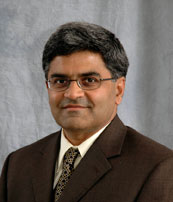Submitted by admin on
American Association for the Advancement of Science Fellow
 Professor Keshav Pingali has been named fellow of the American Association for the Advancement of Science (AAAS) for his distinguished contributions to the "development and application of computer science technologies to enhance the effectiveness of formulating, compiling and executing parallel and distributed programs. Algorithms and tools developed by Professor Pingali's research group are used in many commercial products such as compilers from Intel, IBM and HP. His latest work provides new foundations for parallel computing and promises to dramatically simplify the programming of multicore processors."
Professor Keshav Pingali has been named fellow of the American Association for the Advancement of Science (AAAS) for his distinguished contributions to the "development and application of computer science technologies to enhance the effectiveness of formulating, compiling and executing parallel and distributed programs. Algorithms and tools developed by Professor Pingali's research group are used in many commercial products such as compilers from Intel, IBM and HP. His latest work provides new foundations for parallel computing and promises to dramatically simplify the programming of multicore processors."
Professor Pingali will be presented with an official certificate and a gold rosette pin in San Diego on February 20th.
Read more about this honor at http://www.aaas.org/news/releases/2009/1218fellows.shtml.
IEEE Fellow
Professor Keshav Pingali has been elevated to the level of Fellow of the IEEE Computer Society for his contributions to compilers and parallel computing.
"Each year, following a rigorous evaluation procedure, the IEEE Fellow Committee recommends a select group of recipients for one of the Institute’s most prestigious honors, elevation to IEEE Fellow."
Professor Pingali will receive the IEEE Fellow pin and a certificate that will serve as visible recognition of his elevation to the highest grade of membership in the IEEE.
About Keshav Pingali
Professor Pingali, the W.A."Tex" Moncrief Chair of Grid and Distributed Computing at The University of Texas at Austin, holds positions as a Professor within the Department of Computer Science and the Institute for Computational Engineering and Sciences. He works in programming languages and compiler technology for program understanding, optimization and parallelization. Algorithms and tools developed by his group are used in many commercial products such as the Intel IA-64 compiler, the SGI MIPSPro compiler and the HP-RISC compiler, among others. His current research interests are methodologies and tools for programming multicore processors, with a focus on irregular applications from domains like graphics, scientific computing and data mining, and application-level fault-tolerance in the context of grid computing.







